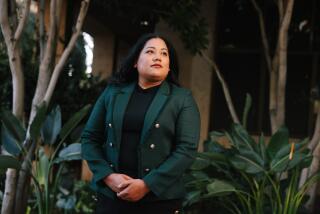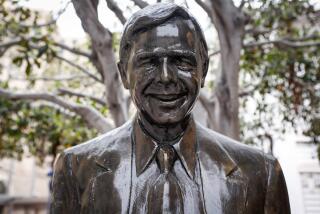Bob Filner’s successor could carry his agenda forward
SAN DIEGO — The harbor seals lounging on the beach in La Jolla have greater protection now from late-night drunks and others who would harass them.
Farther north, the stink from bird guano on the shoreline rocks — once so powerful it sickened tourists, condo owners and restaurant patrons — has been greatly diminished.
In his apologetic yet defiant resignation speech, Bob Filner touted both as achievements — bringing immediate mockery from his litigious adversary Gloria Allred.
Not even the most die-hard Filner loyalists claim the achievements during his tumultuous nine months in office that ended Friday with his resignation were greater than the failures and misdeeds: the hostile treatment of women, the inattention to large-scale policy issues; the bullying, confrontational style; a chaotic approach to management.
Still, there were achievements, small-scale perhaps, but achievements. The candidates to replace him in the Nov. 19 special election will probably not admit it, but they will end up pledging to continue some of his initiatives.
When he was on his game, the 70-year-old Filner, the first Democrat elected mayor of San Diego in two decades, could be decisive and unafraid to wade into issues that risk-averse politicians avoid, even if his moves were never universally applauded.
He ordered the controversial red-light cameras removed from intersections. He called for a more tolerant attitude toward medical marijuana dispensaries. He negotiated a five-year labor agreement with city employees, ending a decade of labor-management strife.
He ordered cars removed from the heart of Balboa Park. He hired a planning director to revitalize the city’s commitment to “livable” neighborhoods and talked about making San Diego a more bike-friendly city.
Once a month, he met with individual citizens, many from lower-income neighborhoods, and pledged to wield his “strong mayor” powers to address their grievances, including zoning problems, barking dogs and questionable police practices.
He also had big, if unrealistic, dreams: a binational Olympic Games with Tijuana; city buildings converted to solar power; a waterfront dedicated not to tourist hotels but to providing middle-class blue-collar jobs. Many of his larger plans were undercut by lack of time or a lack of follow-through when the rhetoric of campaigning gave way to the hard grind of governing.
He promised to fight hotel chains to force them to raise the pay of maids and bellhops. City Council President Todd Gloria, whose mother was a hotel maid, hoped to join Filner in that effort, but Filner’s abrasive, dismissive behavior drove a wedge between the two. Now Gloria is acting mayor until a successor is elected.
All of Filner’s plans came crashing down with a swiftness that has no precedent even in a city accustomed to political turmoil.
The events that forced Roger Hedgecock’s ouster as mayor in 1985 took more than a year and a half to play out. The controversy that led to Dick Murphy’s decision in 2005 to resign had simmered for a year.
But for Filner, it was six weeks from the first allegation of sexual harassment to the negotiated deal with the City Council to trade his resignation in exchange for the city picking up the bill for his legal defense in a lawsuit filed by a former staff member.
After the council’s 7-0 vote Aug. 23 to accept the deal, council members took turns blasting Filner for his conduct toward women and for allegedly leading the government into paralysis and national scorn.
Councilwoman Marti Emerald, who had been one of the last to call for Filner to resign, took a different approach — saying that the forced resignation should not be cause for celebration. Filner’s agenda for change, she said, should not be abandoned.
“While I believe the right decision has been made,” said Emerald, a former television reporter, “I’ve known Bob Filner for 30 years and what a champion he has been.”
When he was on the City Council, before being elected in 1992 to the U.S. House of Representatives, the city was still run by a city manager. Voters dumped that system in 2004. Filner was the second mayor to inherit authority over city departments and veto power over council actions.
“I don’t have to ask anybody, no more city manager,” he said after a few months in office. “I just can tell people to do things, and they get done.”
To protect the seals, Filner had ordered a rope barrier, closure of the Children’s Pool beach at night, and then installation of a 24-hour surveillance camera. The pro-seal faction was happy, but those who feel the beach belongs to people, not the seals, were not.
In June he cut through the bureaucratic/environmental stalemate that had allowed a build-up of guano on the rocks in La Jolla. He hired a firm to scrub the rocks. A second washing is due in weeks.
After the council approved the deal that included his resignation, Filner listed seal protection and guano cleanup among his achievements.
“We protected seals, and we protected La Jolla from the poop from the seals and others,” he said.
Within minutes, Allred had a response.
“Unfortunately, he failed to give as much protection to the women who came into contact with him as he gave the seals,” she emailed reporters. “Women were at risk when they were near the mayor.”
One of his last high-profile acts as mayor came in mid-June, a month before the beginning of the scandal that drove him from office.
With a public relations flourish, he announced the hiring of a nationally known planning director, former Ventura Mayor Bill Fulton, to “lead this city in a new direction” to improve neighborhoods.
The announcement encouraged reporters seeking more information to contact Irene McCormack Jackson, the mayor’s director of communications.
Within days, Jackson had angrily confronted Filner about his treatment of staff members. She was transferred to another City Hall job, and on July 22, she and Allred announced the filing of her sexual harassment suit against Filner and the city.
By filing the lawsuit, Jackson became the first of 19 women to accuse Filner of inappropriate touching and sexually suggestive comments.
After Filner’s resignation speech, Jackson expressed relief that Filner “will not be in a position to prey on any more women.”
“Bye-bye Bob,” she said. “You will not be missed.”
More to Read
Start your day right
Sign up for Essential California for news, features and recommendations from the L.A. Times and beyond in your inbox six days a week.
You may occasionally receive promotional content from the Los Angeles Times.






